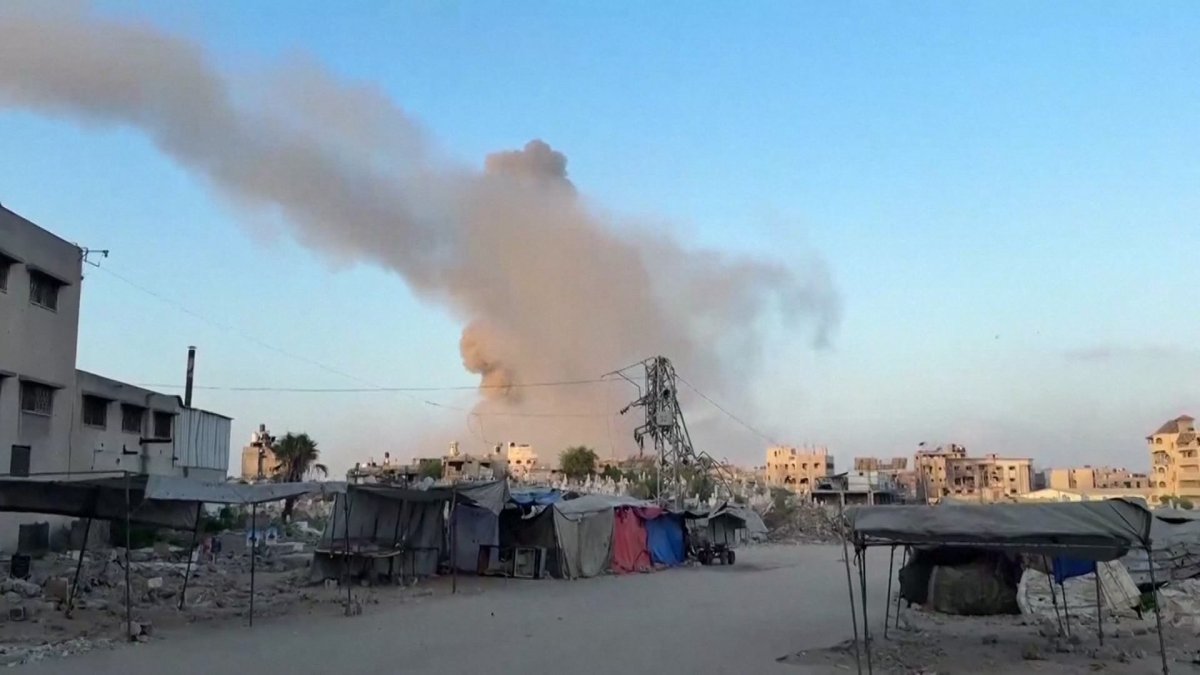A Fort Worth doctor said he’s “devastated” after the hospital he recently volunteered at in the Gaza Strip was struck by Israel on Monday, killing at least 20 people.
“My feelings can hardly be put into words. I was devastated and I was angry,” said Dr. Hamid Kadiwala, a neurologist in Fort Worth who found out about the bombing while driving into work.
Nasser Hospital, one of the main medical centers left in Gaza, was hit with a ‘double tap’ strike. As first responders, health care providers, and journalists responded to the first Israeli airstrike, another occurred.
Twenty people, including first responders, medics, and journalists, were killed. Five of the Palestinian journalists who died worked as freelancers for the Associated Press, Al Jazeera, Reuters, and the Middle East Eye.
The strikes took place during a live feed, and according to Reuters, the journalist recording live was killed in the first strike. The video shows a group of people rushing to an outdoor stairwell to help those injured when the strike happened.
“When is enough enough? As devastating as it is, this is one horrible incident in a line of incidents that are happening over and over again,” expressed Kadiwala.
The neurologist said most recently traveled to Gaza in December, where he volunteered and took care of chronic patients. He said the hospital had roughly 360 beds, but was overflowing with thousands of patients.
“There are people who are constantly getting hurt, constantly needing surgery, but there are also people who are not getting their medicines, they’re not getting treatment for things that they would normally do. So, something as simple as blood pressure issues, elevated blood pressure, diabetes, for example, when they’re not getting their medicines, this can turn into something like a stroke, which is in need of neurology,” explained Kadiwala.
Kadiwala said he spoke with a friend from the hospital who was hurt in the strike on Monday.
“He was actually injured in this attack, and he was telling me how, despite his injury, he was there trying to help people,” explained Kadiwala. “While they’re trying to take care of patients, even in that sacred area, they were hurt and bombed at the time.”
The group of neurologists he worked with said they’re okay, and he hopes it stays that way. Kadiwala said the area hit included the fourth floor, which is where he stayed when he volunteered.
“It’s one thing to hear about something, but it’s completely a different thing when you’ve actually experienced the lives of these people, the amazing resilience they have, and you know how hard they’re striving and how much of a struggle day-by-day they have to put up with,” expressed Kadiwala.
According to the Associated Press, Israeli media reported troops fired two artillery shells at the hospital to target a Hamas surveillance camera on the roof, but there was no immediate proof to support the accusation.
On Tuesday, the Israel Foreign Ministry posted on ‘X’ a statement regarding their initial investigation, which, according to NBC News, the Israeli military said it had concluded its initial investigation of what happened.
On Monday, Prime Minister Benjamin Netanyahu said it was a “tragic mishap.” In a statement, Netanyahu said: “Israel deeply regrets the tragic mishap that occurred today at the Nasser Hospital in Gaza. Israel values the work of journalists, medical staff, and all civilians. The military authorities are conducting a thorough investigation. Our war is with Hamas terrorists. Our goals are defeating Hamas and bringing our hostages home.”
President Donald Trump said he was “not happy” about the Israeli air strike on the Gaza hospital.
Antonio Guterres, the U.N. Secretary-General, demanded an independent investigation into the strikes.
Last week, the Integrated Food Security Phase Classification, or IPC, declared a famine in the northern part of Gaza. Israel has denied the famine report.
“There was a medical student working so hard, and the famine is so severe there right now that he went three days without having a loaf of bread, and he actually passed out. These are medical students. These are not even doctors who are working this hard in this hospital,” described Kadiwala. “When I left Gaza, the one thing they asked of me was ‘don’t let us die in darkness. Tell the people there what you’ve seen.'”
